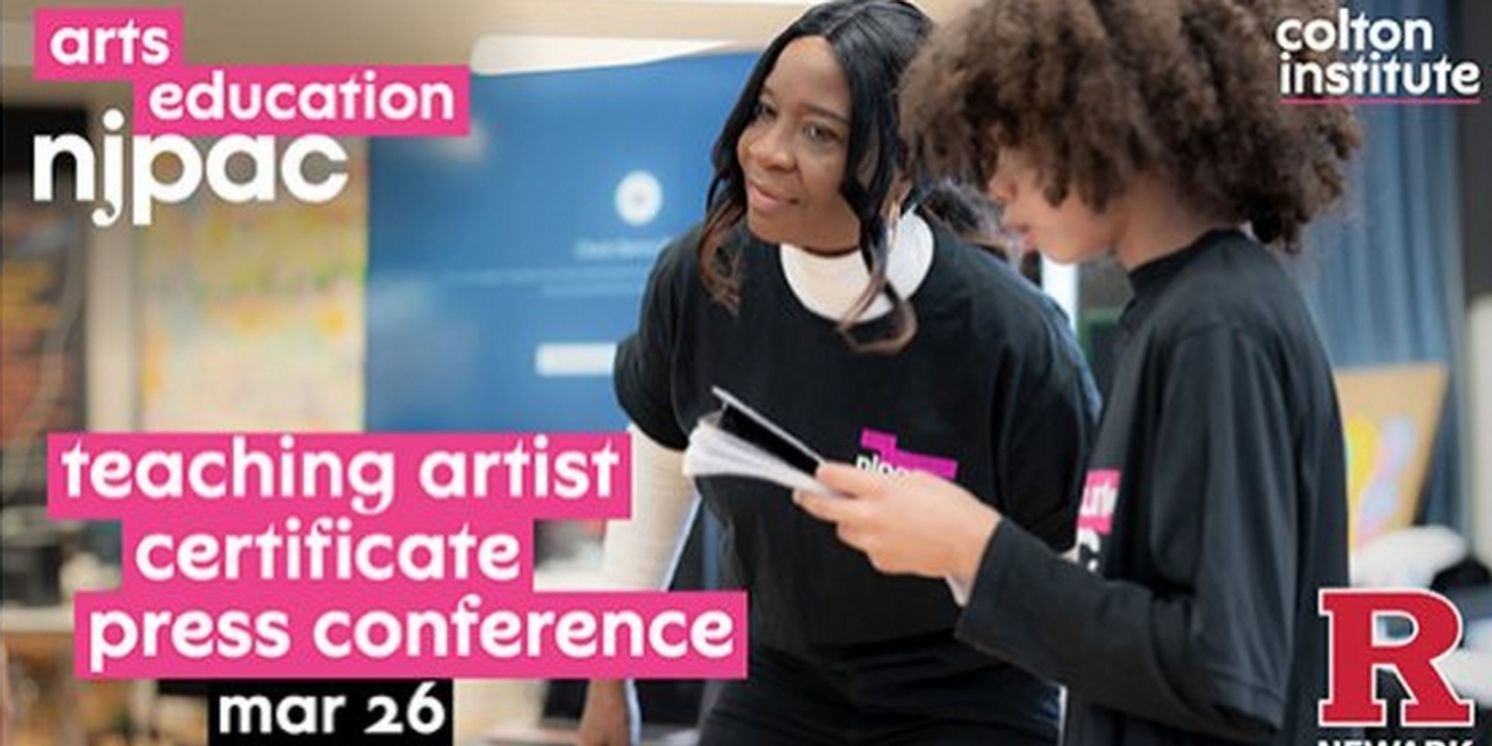NJPAC And Rutgers University–Newark Jointly Launch Teaching Artist Certificate Program
This program marks the first educational partnership between a performing arts center and research university.

New Jersey Performing Arts Center and Rutgers University–Newark School of Arts and Sciences announce a new Teaching Artist certificate program to provide practical skills and an understanding of sound business practices for teaching artists to apply in educational, community, healthcare and corporate settings.
This program marks the first educational partnership between a performing arts center and research university.
“Rutgers University–Newark is the ideal partner for this groundbreaking collaboration because we share an ethos for education that is grounded in culturally-responsive, trauma-informed and justice-oriented ways of teaching,” says Jennifer Tsukayama, Vice President, Arts Education at NJPAC. “We are excited to collaborate with higher education to further advance the vocation and train future teaching artists with the skills they need to facilitate arts engagements equitably and inclusively.”
The curriculum is facilitated by several faculty from RU-N's Urban Education Department and Arts, Culture & Media Department as well as nationally-recognized experts in the field including author and teaching artist Eric Booth. At NJPAC, the certificate is part of the suite of programs of the Colton Institute for Training and Research in the Arts which includes an expansion of professional development for teaching artists.
“NJPAC has been a leader in cultivating teaching artists,” says Lynnette Mawhinney, Sr. Associate Dean at SASN. “This partnership with RU-N creates more pathways and opportunities for high quality teaching artists, while supporting them in generating their own business as a teaching artist.”
“This teaching artist initiative leans into the School of Arts and Sciences–Newark's commitment to the arts and to imagining the arts as a vehicle for social good,” says Jacqueline Mattis, Dean of SASN. “NJPAC and Rutgers University–Newark have long had a wonderful relationship. This program is especially exciting, though, both because it deploys a unique teaching model, and because it powerfully integrates the many strengths of an outstanding center for the arts and the transdisciplinary excellence of a liberal arts university to ensure one outcome: that artists have the conceptual and practical skills, and opportunities that they need to support their professional success in an increasingly complex marketplace.”
The Teaching Artist Certificate program was announced at a press event on March 26 at NJPAC.
Featured speakers included representatives from NJPAC and Rutgers University– Newark: John Schreiber, NJPAC President and CEO; Jennifer Tsukayama, Vice President, Arts Education, NJPAC; Jacqueline Mattis, Dean of Faculty, Rutgers SASN; and Lynnette Mawhinney, Sr. Associate Dean at Rutgers SASN. Eric Booth, author and international expert on teaching artistry, also spoke at the event.
The inaugural semester of the program is an eight-week summer intensive that will run from June 10 – August 2, 2024. Classes meet Monday through Friday from 10AM – 4PM on the campuses of Rutgers University–Newark and NJPAC's Center for Arts Education.
The fee for the program is $3,500. More information and the application is available at sasn.rutgers.edu/njpac-teaching-artist-certificate. Applications will be accepted until all seats are filled. The priority deadline is April 30.
The curriculum of the Teaching Artist Certificate program reflects the power of the arts to foster social and emotional growth by emphasizing culturally responsive and inclusive teaching practices.
Through a combination of theory, coursework, fieldwork, networking opportunities and reflective evaluation, students gain personal and professional development that will prepare them to make meaningful differences in the lives of their students and communities.
Ideal candidates include college students, change-of-career individuals with a creative practice and artists who seek business knowledge and a foundation in teaching and learning methods.
“The new NJPAC-Rutgers Teaching Artist Certificate program provides exactly what the field and its emerging talent needs: effective pathways into the field,” says Eric Booth, founder of International Teaching Artists Collaborative and an advisor to the certificate program. “This strong new program sets a foundation of the best learning in the field, strengthened by a blend of academic and practical savvy, which will invigorate the teaching artist field as much as it will inspire its students.”
About NJPAC
New Jersey Performing Arts Center (NJPAC), located in downtown Newark, New Jersey, is among the largest performing arts centers in the United States. It is the artistic, cultural, educational and civic center of New Jersey — where great performances and events enhance and transform lives every day. As New Jersey's anchor cultural institution, NJPAC brings diverse communities together, providing access to all and showcasing the state's and the world's best artists while acting as a leading catalyst in the revitalization of its home city. Through its extensive Arts Education programs, NJPAC is shaping the next generation of artists and arts enthusiasts. NJPAC has attracted more than 11 million visitors (including more than two million children) since opening its doors in 1997, and nurtures meaningful and lasting relationships with each of its constituents. Visit njpac.org for more information.
About Rutgers University–Newark
Rutgers University–Newark (RU-N) is a diverse, urban, public research university that is an anchor institution in New Jersey's cultural capital. It is exceptionally well positioned to fulfill higher education's promise as an engine of discovery, innovation, and social mobility. It has a remarkable legacy of producing high-impact scholarship that is connected to the great questions and challenges of the world. It is in and of a city and region where its work on local challenges undertaken with partners from many sectors resonates powerfully throughout our urbanizing world. Most importantly, RU-N brings an incredible diversity of people to this work—students, faculty, staff, and community partners—making it more innovative, more creative, more engaging, and more relevant for our time and the times ahead.
Videos


